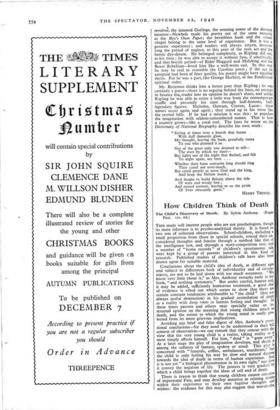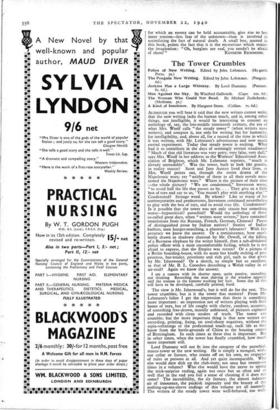How Children Think of Death
The Child's Discovery of Death. By Sylvia Anthony. (Kegan Paul. Its. 6d.)
THIS study will interest people who are not psychologists, though its main reference is to psycho-analytical theory. It is based on
two sets of collected observations. School-children, including a small proportion from those in special schools, voiced their un- considered thoughts and fancies through a method like that of the intelligence test, and through a story-competition test; and a number of "home records" of children's spontaneous talk were kept by a group of parents interested in this kind of research. Published studies of . children's talk have also been drawn upon for suitable material.
Conclusions about the child's idea of death, at different ages and subjezt to differences both of individuality and of circum- stance, are not to be laid down with too much assurance. "We know very little about it," as Mrs. Anthony remarks early in her book, "and nothing systematic." But under careful, human and,
it may be added, sufficiently humorous treatment, a good deal of evidence is sifted out which seems to show that there are certain constant tendencies attributable to "the child" (that not always useful abstraction) in his gradual assimilation of death as a reality with deep roots in human feeling and thought. In these times parents and others may specially value an in- structed opinion on the meaning that young children attach to death, and the extent to which the young mind is really pro- tected from its more grievous implications. Avoiding any brief and false digest of Mrs. Anthony's provi- sional conclusions—for they need to be understood in their full context of observation—we can remark that they concur with the view that the very young child is a realist, taking reality as 1,t, most simply affects himself. For him, " dead " is "gone away. At a later stage the play of imagination develops, and death .0 among the subjects of fantasy, spoken or acted. This play Ls concerned with "funerals, coffins, ambulances, murderers," but the child is only feeling his way by .slow and natural degrees towards the idea of death in terms of human experience. And it is not yet "a biological phenomenon in its own right," nor does it convey the negation of life. The process is very gradual by which a child brings together the ideas of self and of death
There is reason to think that young children cannot conceive of impersonal Fate, and may develop anxieties in relating death! within their experience to their own fugitive thoughts aria wishes: the evidence for this may also suggest that war-deaths,
for which an enemy can be held accountable, give rise to less inner tension—less fear of the unknown—than is involved in assimilating the fact of natural death. A small boy, quoted in this book, points the fact that it is the mysterioug which strains the imagination: "Oh, burglars are real, you needn't be afraid



























































 Previous page
Previous page